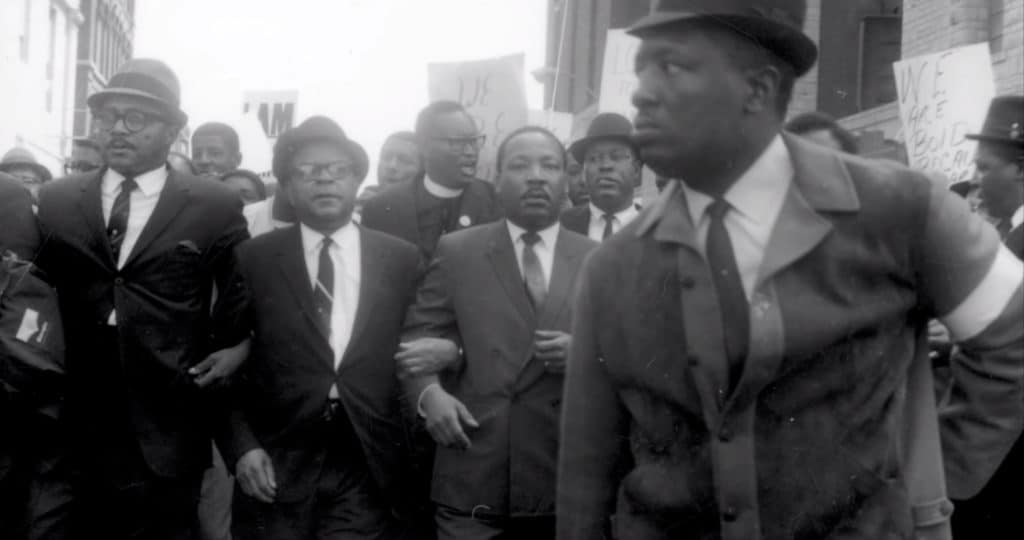Moviegoer: MLK/FBI

The quest to destroy a civil rights icon
By Diana Beechener
In the 1960s the FBI was focused on eliminating what they considered to be one of the greatest threats to America at the time: Dr. Martin Luther King Jr.
The extent of their fear toward King’s influence is documented in newly declassified documents now available in the National Archives and turned into a brilliant film, MLK/FBI, available on several streaming platforms.
FBI director J. Edgar Hoover believed King’s dedication to the civil rights movement was a danger to America. He feared King was what he dubbed a “Black Messiah,” who would lead his people to destroy American values. He assigned teams to look into the reverend, hoping to prove he was a seditionist, or even worse, a communist.
Though there was never any evidence that King was doing illegal things, the FBI did uncover something interesting: King was a serial philanderer. They had hours of tapes of sexual escapades and wanted to use them in a campaign to disgrace him and discredit the movement.
At first, President Johnson was against the idea, considering King to be a benign figure in America. But when King spoke out against the Vietnam War, Johnson gave the go-ahead to use King’s private life to ruin his public image. Letters were sent to King, implying he should take his life to avoid embarrassment. His wife was harassed with tapes of her husband’s sexual encounters. Church groups were given reports meant to ruin the reputation of King and his cause.
Did the FBI go too far in their quest to stop King from speaking against the government? And when the audio tapes of King’s liaisons are released in 2027, will they finally damage the iconic image of the man who was the face of the civil rights movement?
Documentarian Sam Pollard (Why We Hate) combed through the declassified documents, constructing exactly how the FBI conspired to harass and control King via surveillance. Using predominately archival footage and interviews with historians, former FBI brass, and King’s confidants, Pollard picks apart why King was viewed as a threat and how the FBI’s deep roots in media and government aided their war against him.
Pollard dismantles the FBI’s public image, carefully crafted in large by Hoover himself. Clips from FBI-approved films like I Was a Communist for the FBI, show how the agency cast themselves as the only line of defense between Americans and communism. Hoover also appears in clips, espousing his views on the direction of America and decrying the dangers of agitators like King. The use of archival footage is a wonderful touch, as instead of having modern historians decry racist practices within the government, we see and hear them firsthand. Pollard allows the men who organized the investigation to damn themselves with their own words.
Those who worked with King discuss what constant FBI scrutiny and harassment did to hurt both the civil rights leader and his family. Already under threat from those who hated his work, this extra pressure took an immense toll on King’s mental and physical well-being.
The film asks whether or not Dr. King’s legacy changes when his moral failings are brought to light. It’s true he broke moral codes and marriage vows, but Pollard asks whether any of that changes his work toward voting rights, civil liberties, or peace. He points out that our culture appreciates simplicity— many have forgotten King’s disapproval of Vietnam and his campaign against poverty that demanded better wages and resources for the impoverished. Will the idea of a complex, flawed man take away from his accomplishments?
Pollard also uses modern issues to reframe King’s persecution. He examines how anything that challenges our belief in our inherent American goodness can quickly whip up violence. The FBI didn’t want to destroy King because they genuinely thought he was a communist, rather they found his spotlighting of racist systems embarrassing. Hoover couldn’t forgive anyone he saw as hurting American idealism. It’s impossible not to watch Pollard’s film and draw parallels to recent events.
Poignant, infuriating, and filled with historic insight, MLK/FBI is not just a documentary, it’s a warning. Watch the film then dive into the National Archives to see just how fear and unchecked power can go wrong.
Great Documentary * NR * 104 mins.
